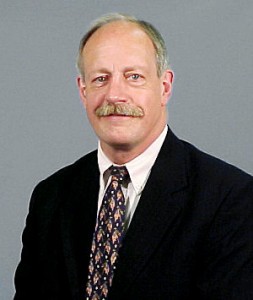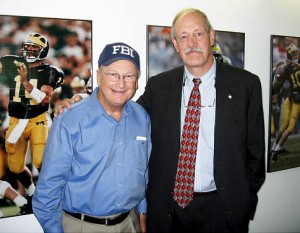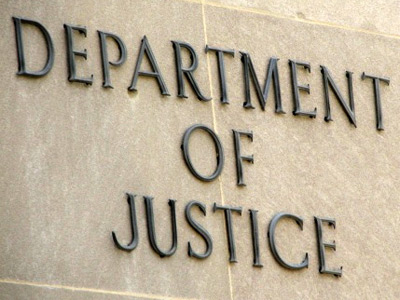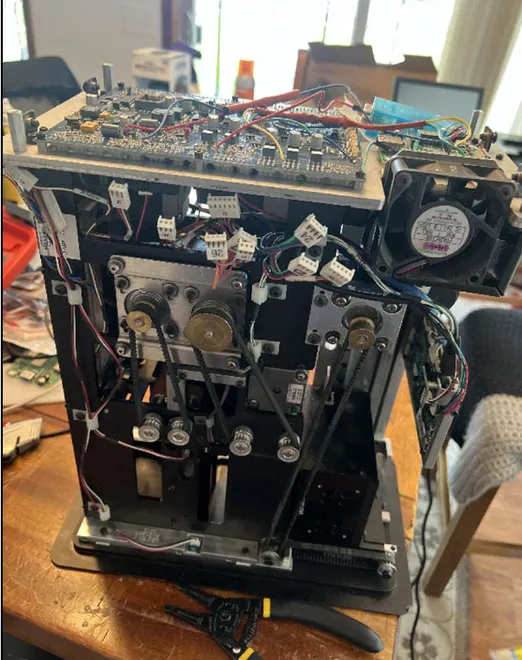
I recently read the “Time” magazine profile of FBI Director Robert Mueller noting that his 10-year statutory term was coming to an end. It was mentioned that the Director is a big baseball fan especially of the Boston Red Sox. I have also read speculation about what may be in Dir. Mueller’s future, among other things, that he might be a possible replacement for Bud Selig as Major League Baseball (MLB) Commissioner. Apparently that may have to wait considering the White House has announced that it will ask Congress to extend Dir. Mueller’s tenure by 2 years.
I think there may be some irony in the mentioning of the director and the baseball commissioner job. Without spoiling the whole story, I just want to say maybe one day the director may want to offer me an apology.
It was mid-February, 2005, I was sitting in my office at the FBI Resident Agency in Ann Arbor, Mi., when I received a phone call from a couple of reporters from the “New York Daily News.”
They had been referred to me by Michael Leibson, an Assistant US Attorney in Detroit, who had prosecuted a steroid case with me about 10 years before. (It was actually many cases stemming from an undercover operation. Over 70 steroid dealers were convicted in the US and Canada.)
Let me back up even further. In 1989, Bo Schembechler, the football coach at the University of Michigan convinced me that anabolic steroids were a serious problem in high school and college football. (Not all steroids are anabolic, promoting muscle growth, but for simplicity I will refer to anabolic steroids as just steroids.)

Based on Bo’s concerns and some additional research, I proposed a limited undercover operation (UCO), to target the sale of illegal steroids, the first of its kind.
FBI headquarters begrudgingly authorized it (see my column, “FBI Probe into Illegal Steroids Broke New Ground” ).
What started as regional short-term investigation became a very successful international investigation, codenamed “ Equine”, that ran for over 3 years.
One of the dealers we prosecuted was Curtis Wenzlaff. He told us that he had supplied large amounts of steroids to players on the Oakland A’s baseball team; specifically Jose Canseco and Mark McGwire. The undercover operation ended in 1993, but prosecutions continued for a few years thereafter.
In August, 1994, I attended a sports presentation conference at the FBI Academy in Quantico, Va. (The sports presentation program had been established to train FBI agents to speak to college and pro teams about sports bribery and gambling. The presentations expanded into other topics over time.) Also in attendance at this conference were representatives from the NCAA, NFL, NBA, NHL and MLB. From the MLB the representative was Kevin Hallinan, MLB Director of Security.
Prior to this conference, I had written an article for the August, 1994, “FBI Law Enforcement Bulletin,” a national monthly magazine primarily distributed to law enforcement agencies.. The article, “They Shoot Horses Don’t They? Anabolic Steroids and Their Challenge to Law Enforcement,” was distributed to all the attendees at the conference.
That night many of the conference attendees had an informal session in the Board Room, the FBI Academy pub.
At that session Kevin Hallinan and I talked about steroids. I told Hallinan what Curtis Wenzlaff had told us about supplying steroids to players on the Oakland A’s including Jose Canseco, and my belief that steroid use was becoming pervasive in MLB as it had been in football. Hallinan said he had heard rumors of steroid use in MLB and that Canseco was one of the players alleged to be using.
Hallinan didn’t think there was much they could do as the players had rejected any efforts to require testing in the contract that had been negotiated following the strike. I told Hallinan to let me know if we could be of any assistance, but I never heard from him. In 2002, I did arrange through Hallinan to have Wenzlaff debriefed by one of Hallinan’s staff.
In the summer of 2004, I also arranged for Wenzlaff to testify before a Senate hearing regarding steroid use in sports, chaired by Senators Charles Grassley and Joseph Biden.
Christian Red from the “NY Daily News” interviewed Wenzlaff after the hearing. Wenzlaff told Red what he told us about supplying steroids to players on the Oakland As, principally Canseco, in the early 90’s. They asked if Wenzlaff had disclosed this information to the FBI. He told them he had, but he did not know whether the FBI had passed the information on to MLB.
Now back to 2005, my office in Ann Arbor and the phone call from Christian Red and T.J. Quinn (now with ESPN) of the Daily News. Red and Quinn told me they had been referred to me by Mike Leibson, the AUSA, who had prosecuted most of the Equine cases. They also told me about their interview of Wenzlaff. What they wanted to know was, had the FBI passed the Wenzlaff information on to MLB?
A moment of truth: I could have responded, “no comment”, but I knew that if I had, it would be thought that the FBI had not passed on the information.
Here was a situation where the FBI did the right thing. All the criminal cases arising from Equine had long since been adjudicated. (The usual reason for not commenting to the media is that it is inappropriate if a case(s) is being investigated or prosecuted.) So I said I had told MLB about Wenzlaff’s allegations.
I said in August, 1994, I had told the MLB’s Dir.of Security, Kevin Hallinan everything Wenzlaff had told us about his having supplied Canseco and other players on the Oakland A’s with steroids. (It wasn’t until after I had spoken to Hallinan that we learned from Wenzlaff that one of the other Oakland As players being supplied was Mark McGwire.)
The next day the fecal matter hit the air oscillating device as they say.
The front sports page of the Daily News read, “Agent: MLB turned blind eye to steroid warning 10 years ago. FBI says… THEY KNEW!” –over a full-page photo of MLB Commissioner Bud Selig, resting his head in his hand. The MLB Commissioner’s office was quick to respond by denying that I had ever warned them. In fact Kevin Hallinan claimed to not even know me.
I had no idea about the Daily News article until I started receiving calls from all over the country including from Mike Wallace from “60 Minutes.”
Then I received a call from my Assistant Special Agent in Charge (ASAC). The Detroit Special Agent in Charge (SAC), who happened to be in Washington at the time, had spoken to the Director (Robert Mueller).
I was instructed by the ASAC to make no further comments to the media. It would seem my 15 minutes of fame were over. I explained that I had not initiated any contact with the media and that the Daily News had been referred to me by the AUSA, who prosecuted the case.
My concern was having made a statement saying the FBI had warned MLB, would it now look like we were backing down in the face of MLB’s denials if the FBI made no further comment?
I did get a follow-up call from the Daily News. I told them I had been instructed not to make any further statements to the media.
Red & Quinn wanted to know if I was now retracting any part of my previous statements. I said I was not, and my reported quote was, “I don’t think I was off-base with anything I said….I hope the Bureau allows me to defend myself if necessary, but I’m not particularly worried. I can weather the storm.”
When Dir. Mueller told me to not talk to the media, (For the record, I have never met nor spoken to the Director, but was told that it was he.) I thought that maybe the FBI would support me. Instead the silence was deafening.
In the meantime the MLB continued to attack my veracity, but slowly over the next few days, they moved from complete denial to admitting, well maybe I had warned them.
The FBI never did provide any support for me or for my statement that the FBI had warned MLB about their steroid problem in 1994. It was gratifying to have others outside the Bureau go to bat for me (so to speak). Bo Schembechler told the Daily News, “If Greg Stejskal said it, that’s the way it is.” I can’t think of a better character reference than that.
I retired from the FBI in the fall of 2006, having served for almost 32 years. I never did hear from the Director although I was given a 6 month extension beyond my mandatory retirement date. The extension had to have been approved by the Director.
None of this is meant to demean the tenure of Dir. Mueller, but there are times when it is important to protect the reputation of the FBI and support the agents when they are fighting the good fight even if it means taking on institutions like MLB.
Maybe some day if Dir. Mueller does become Commissioner of MLB, he can send me an apology.




